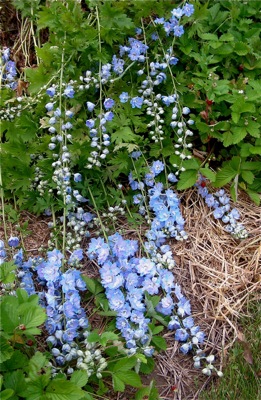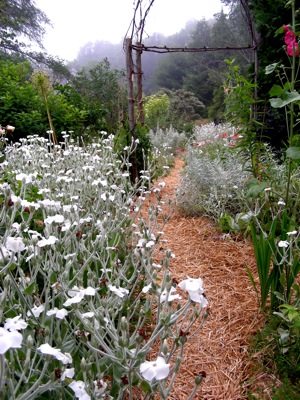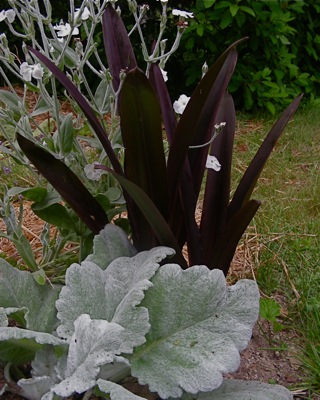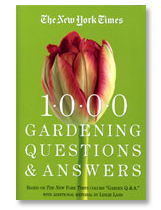Dealing With Drought in the Garden
How dry we are! It’s just the worst – our sliver of the Maine coast has had less than a half inch of rain in the last 5 weeks and we have only a shallow well, barely enough for dishes and showers. I’m watering the joint with my tears, and when friends complain they’ve been stuck dragging hoses around for eversolong, it’s hard for me to dredge up much sympathy.
Some crops are going to be all right, and there’s still plenty going on – Lois had no trouble finding something to paint the other day
but if you look a little closer you see that those gone-by foxgloves ( which shouldn’t be gone by just yet) never made the usual 6 feet, that those last iris are curled at the edges, and of course that Lo had to install an umbrella to shield herself from the broiling sun.
In California, yes. In Maine, supposedly no. But we’ve had more and more summers lately that seem more like the left coast than this one; our vaunted resemblance to England appears to be a thing of the past. (So does England’s, of course, but let’s not talk about that.)
Let’s not talk about the delphiniums, either, except to say that hot, thirsty plants have trouble withstanding the 40 mile an hour winds that breeze through promising thunderstorms and leave, their only contribution to dry things out a bit more.
On the good side:
* Mulch really does help –where we put heaps there is still some moisture (admittedly not lots) in the root zone. But it looks like deep mulch can insulate the soil from light rain as well as from drying heat. The well mulched tomatoes and peas in troughs of bare soil about 6 inches wide are doing better than the lettuces and chard – also planted in water-catching depressions – that are tucked in tight.
* When perennials start drooping, letting the annuals go doesn’t take lots of will power. The tiny bit of water we can spare is preserving roses, not cosmos.
* The more you deadhead, the less work the plants must do, so when dragging the hose around is out, it’s a relief to use the worry energy preventing seed formation.
*Everything they say about silver-leafed plants being drought-resistant is true
The lychnis and artemisia are vigorously self-sowing and self-spreading respectively, but given the sandiness of our soil and the paucity of our precipitation it seems ungrateful to complain.
It’s not clear whether the purple eucomis will ever bloom, but it looks nice with the Salvia argentea, which also looks nice because it’s in its first year ( the second year it puts up flower stalks, after which it looks ratty until the next spring).


















Here in the wilds of Upstate NY, east of Cooperstown, we had our first good rain of the summer last night. The creek was singing this morning-and I’ve missed hearing it since the last Spring rains left us. As our gardens evolve into a pastiche of native plantings, we find water needs diminish. My formative garden years were spent in California where I learned the value of all things native ( and Mediterranean). Yes, the food garden gets water when needed but our definition of garden-worthy plants is changing from those that wow us to those that perform in our harsh and challenging climate. Those that can do that and still wow us, get extra credit.. Notice how the fields are still lush? Solidago, aster, asclepias-they are all succeeding with or without what used to be dependable rain in the Northeast. The added benefit of growing natives is providing food sources for the native fauna. Grow native is my new motto.
Go ruralway!
(Sorry not to have replied sooner; your comment got lumped in with the spam for reasons known only to the screening program.)
It’s great to hear your wild things are flourishing – and I’m jealous of your ability to water the food plants. Here in Midcoast Maine we STILL have nothing; sky is overcast and spitting at the moment but it’s just one of those teasers where the ground under the leaves stays dry and only the snails get any benefit.
Even the fields are far from lush; we had a few days of perfume from the blooming milkweed but now the plants are looking pinched, as is the goldenrod, as are the blackberries. Net result is more native fauna in the food garden and in the separate pea patch, where field mice are doing a job on the (bearing) vines, nipping, nipping and nipping again in their search for something juicy.
Of course, it might be voles, in which case I apologize to the mice.
We’ve moved into a series of tropical downpours. It will rain for a short time but so violently that I think about ark-building. Then the humidity drops and the skies blue-up and all is peaceful again. I don’t remember this kind of weather from when I grew here. It feels different but I can’t be sure. In any event, I am happy for the rain and am joyful I won’t have to water tonight. Our old corn field is being transformed into native trees and shrubs and we try to plant a few each day after work. Gawd, I am blathering-so sorry. I hope our rain finds it way to you tonight.
Thanks for the rain-hope ruralway; it’s finally happening as I type, though who knows for how long. Very dramatic lightening and thunder and so far none of the high winds also in the forecast. So far. But I almost don’t care if it all blows down if it’s soggy when it gets there.
Nothing blathery about your planting news – it’s amazing to hear you’re persisting in the heat of summer. Gotta plant when time permits, even if the season isn’t ideal, but what that must mean for you in the watering department I can scarcely bear to imagine.
Supposedly everybody remembers the weather of youth as different, yet this time it’s almost surely true. Pretty clear at this point the weather IS different from what it was when you ( and I!) grew up, and there will be more and more of these violent swings as the globally warmed years roll on.
Uh-oh, three little paragraphs and it’s already tapering off. I think I’ll go out and shake my fist at the skies.